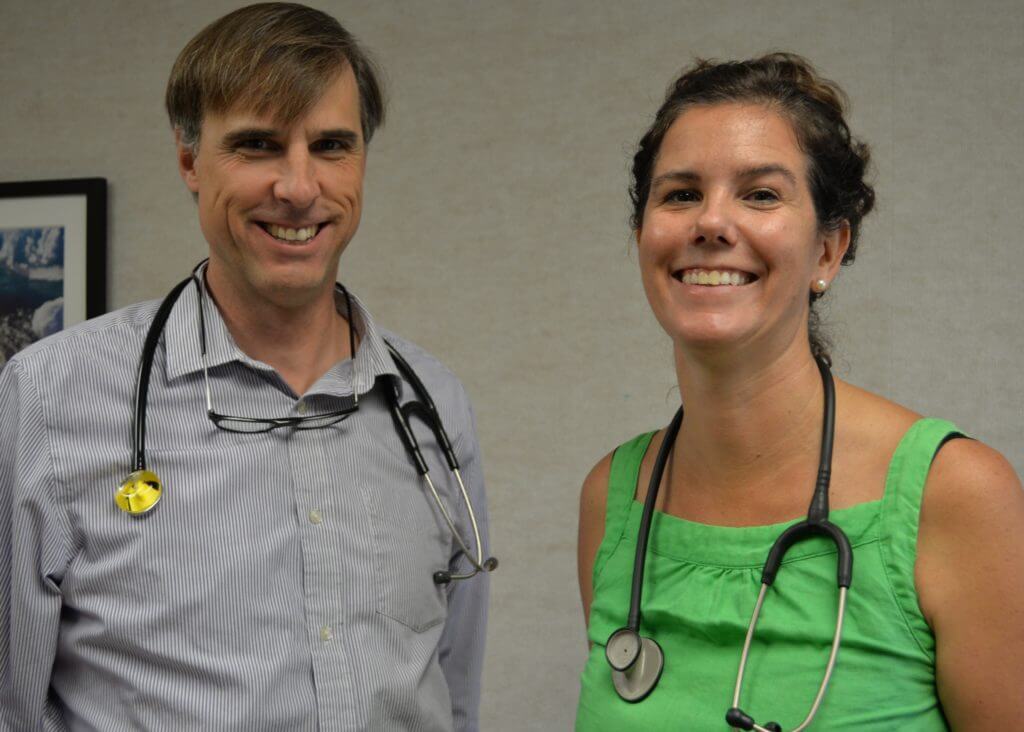Charlotte Family Health merges with Evergreen Family Health in Williston
Independent clinics join resources for long-term sustainability

Whether it’s a nasty zebra mussel gash or a sudden acute illness, same-day appointments for urgent care are always available for patients at the Charlotte Family Health Center. Dr. Andrea Regan is taking measures to ensure they always will be as she and her partner, Dr. Gordon Gieg, merge their small independent community practice with the Evergreen Family Health, a larger independent practice in Williston.
Currently the Charlotte Family Health Center (CFHC) staff includes two physicians, one physician’s assistant and one licensed practical nurse, in addition to four support staff. Evergreen has five physicians, four physician assistants, two nurse practitioners and a dedicated clinical and administrative staff of about 35.
Dr. Regan and Dr. Mike Johnson, Evergreen’s managing partner, have been close colleagues since their careers began. They completed their residencies together at UVM Medical Center. The two clinics joined forces on Oct. 23 in an effort to continue to provide less expensive and more personal medical care, including how much time they can spend with their patients.
As vulnerable private practices across the nation get bought out by large medical centers, patient care becomes much more expensive and far less personal, Regan said. “We are fighting against that tide,” she said. “So we are combining forces to keep that mission strong.”
Johnson said their goals for this merger are “first, to provide the best possible medical care to patients, and second, to be a good place to work.” They are also fighting to prevent their own burnout as primary care doctors. Regan said fewer young doctors are practicing primary medicine in Vermont, and almost 30 percent of the primary care doctors in the state are over 60.
The Charlotte Family Health Center was originally founded in 1975 by Doctors Richard “Bunky” Bernstein and Lee Weisman, both now retired. Dr. Regan joined the practice in 2008 and Dr. Gieg in 2012. Because of its small size, the practice has survived by maintaining low overhead costs, which means that much of the administrative work—including ensuring compliance with health insurance and occupational safety regulations, and battling with electronic medical records software—falls on the two doctors. Another downside of such a small practice is that any accident, something as basic as one of the doctors fracturing a wrist, could jeopardize the practice financially, Regan said.
“All of these things are exhausting,” Regan said. “And when I noticed all independent clinics are fighting the same battle, I started thinking about how we should be sharing these administrative tasks.”
Partnering with Evergreen, which has about 9,000 patients, will give Regan and Gieg and their small staff significant added support, and it has already allowed the combined practices to hire information technology and human relations staffers to help manage both offices.
“For patient care, smaller is better,” Johnson said. “We now need to have a larger administrative structure to fulfill the requirements of our current health care system, but at Evergreen, we are divided up into smaller teams to provide more individualized personable care. Charlotte Family Health Center should remain a small personable team to provide optimal patient care while still benefiting from our combined administrative support.”
This is Evergreen’s first time forming a partnership like this one with Charlotte Family Health Center. “We don’t want to be the last [independent practice] left in town,” he said.
Regan witnessed first-hand how Hinesburg Family Health struggled before the UVM Medical Center took over that family-owned practice a few years ago. “It weighs heavy on my mind,” she said. “They loved their practice. They had to adopt electronic medical records and couldn’t bring in providers. The big lesson for me was they had to make a lot of decisions under financial duress, which is a bad time to make decisions about your career, practice and future.”
Small independent clinics have a bigger challenge in finding good practitioners in large part because of their inability to provide benefit packages for employees, due to lower reimbursement levels for equivalent services compared to hospitals and the inability to subsidize providers’ incomes through additional revenue sources such as MRIs and other imaging. In partnership with Evergreen, however, CFHC is now able to offer health, dental, vision and disability insurance to its staff.
Patients won’t experience any big changes with the merger. While nurses will no longer have to do IT and Reagan and Gieg might be able to take well-deserved lunch breaks without having to make a dozen phone calls, the care won’t change. “Our office will need a lot of support and training through January,” Regan said. “It will be interesting for me to just be a physician again. I am eager to get back to just seeing people.”
Equally important, Regan expects the gains from administrative efficiencies and streamlined internal systems will give her some relief from endless hours working from home, and more time to spend with her husband, Jonathan, and their 17-month-old son, Thomas.
